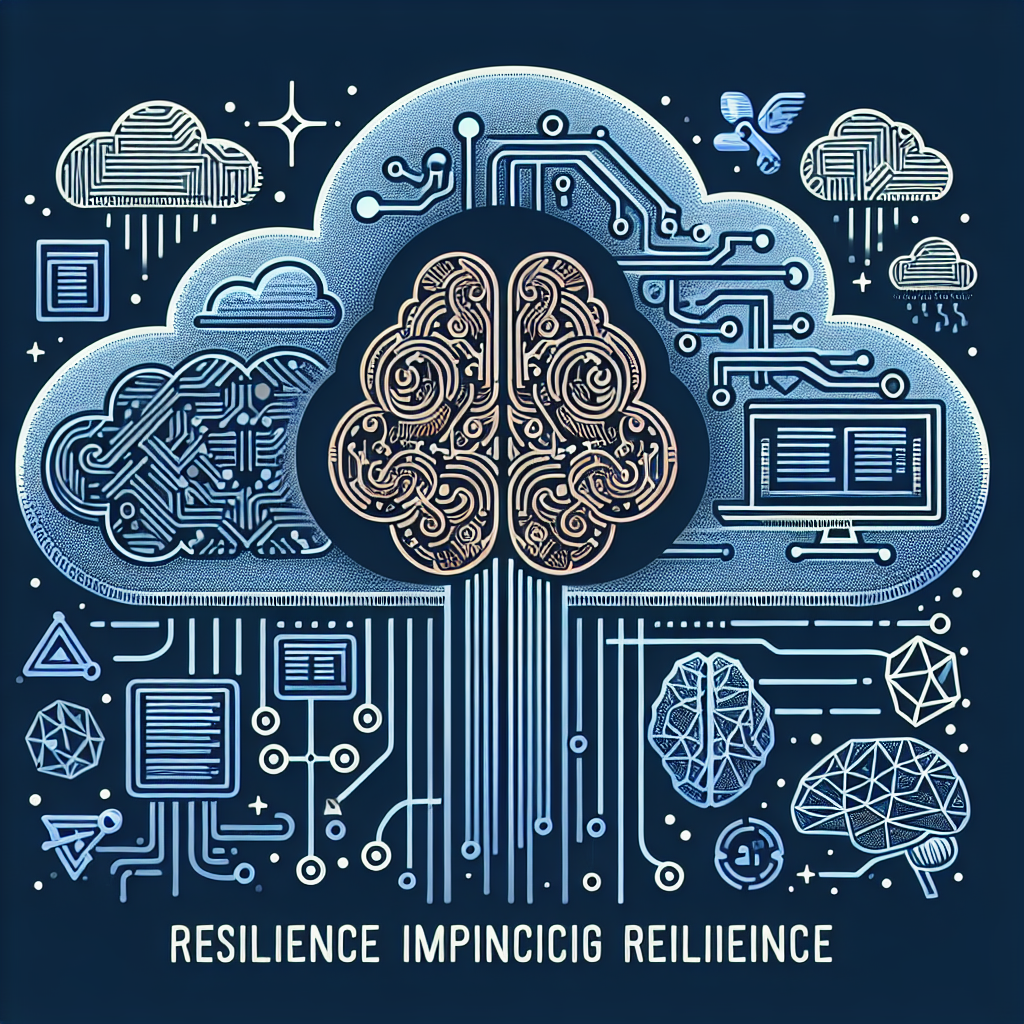Cloud computing has become an essential part of modern businesses, providing a flexible and scalable infrastructure for storing and processing data. However, as reliance on cloud services grows, so does the need for increased resilience to ensure that services remain available and performant in the face of various challenges such as cyberattacks, natural disasters, and hardware failures.
One way to improve cloud service resilience is by leveraging artificial intelligence (AI) technologies. AI can help in identifying and mitigating potential issues before they cause significant disruptions, as well as in responding to incidents in real-time to minimize downtime. In this article, we will explore how AI can be used to enhance cloud service resilience and address some common questions about this approach.
Improving Cloud Service Resilience with AI
AI can be applied in several ways to enhance the resilience of cloud services. Some of the key applications include:
1. Predictive Maintenance: AI algorithms can analyze historical data and patterns to predict potential failures in cloud infrastructure components such as servers, storage, and networking equipment. By identifying issues before they occur, organizations can proactively address them and prevent downtime.
2. Anomaly Detection: AI-powered anomaly detection systems can monitor the behavior of cloud services in real-time and alert administrators to any deviations from normal operation. This can help in identifying security threats, performance issues, or other anomalies that could impact service availability.
3. Automated Incident Response: AI can be used to automate incident response processes, such as identifying the root cause of an issue, applying remediation actions, and coordinating communication with stakeholders. This can help in reducing response times and minimizing the impact of incidents on service availability.
4. Dynamic Resource Allocation: AI algorithms can optimize resource allocation in a cloud environment based on workload patterns, performance metrics, and cost considerations. This can help in ensuring that resources are allocated efficiently to meet service level agreements (SLAs) and minimize the risk of resource exhaustion.
5. Adaptive Security Measures: AI-powered security systems can continuously monitor and adapt security measures to protect cloud services from evolving threats. By leveraging machine learning algorithms, these systems can detect and respond to security incidents in real-time, reducing the risk of data breaches and service disruptions.
FAQs about Improving Cloud Service Resilience with AI
Q: How can AI help in preventing downtime in cloud services?
A: AI can help in preventing downtime by proactively identifying potential issues before they occur, such as hardware failures or performance bottlenecks. By analyzing historical data and patterns, AI algorithms can predict when a component is likely to fail and trigger preventive maintenance actions to address the issue before it impacts service availability.
Q: How does AI-powered anomaly detection work in cloud environments?
A: AI-powered anomaly detection systems monitor the behavior of cloud services in real-time and compare it to historical patterns to identify any deviations. These systems use machine learning algorithms to learn normal behavior and automatically detect anomalies that could indicate security threats, performance issues, or other disruptions. When an anomaly is detected, the system can alert administrators and trigger response actions to address the issue.
Q: Can AI automate incident response in cloud environments?
A: Yes, AI can automate incident response processes in cloud environments by identifying the root cause of an issue, applying remediation actions, and coordinating communication with stakeholders. By leveraging AI algorithms, organizations can reduce response times and minimize the impact of incidents on service availability. Automated incident response can also help in ensuring consistency in response actions and reducing human error.
Q: How can AI optimize resource allocation in cloud environments?
A: AI algorithms can optimize resource allocation in cloud environments by analyzing workload patterns, performance metrics, and cost considerations. By dynamically adjusting resource allocation based on demand and utilization, AI can ensure that resources are allocated efficiently to meet SLAs and minimize the risk of resource exhaustion. Adaptive resource allocation can help in improving performance, reducing costs, and enhancing service resilience.
Q: What are the benefits of using AI for improving cloud service resilience?
A: Some of the key benefits of using AI for improving cloud service resilience include:
– Proactive issue identification: AI can predict potential issues before they occur, helping in preventing downtime and service disruptions.
– Real-time anomaly detection: AI-powered systems can monitor cloud services in real-time and alert administrators to any deviations from normal operation.
– Automated incident response: AI can automate incident response processes, reducing response times and minimizing the impact of incidents on service availability.
– Dynamic resource allocation: AI algorithms can optimize resource allocation based on workload patterns, performance metrics, and cost considerations, ensuring efficient resource utilization.
– Adaptive security measures: AI-powered security systems can continuously monitor and adapt security measures to protect cloud services from evolving threats.
In conclusion, AI technologies can play a significant role in enhancing the resilience of cloud services by enabling proactive issue identification, real-time anomaly detection, automated incident response, dynamic resource allocation, and adaptive security measures. By leveraging AI capabilities, organizations can improve the availability, performance, and security of cloud services, ensuring that they meet the evolving needs of modern businesses.

